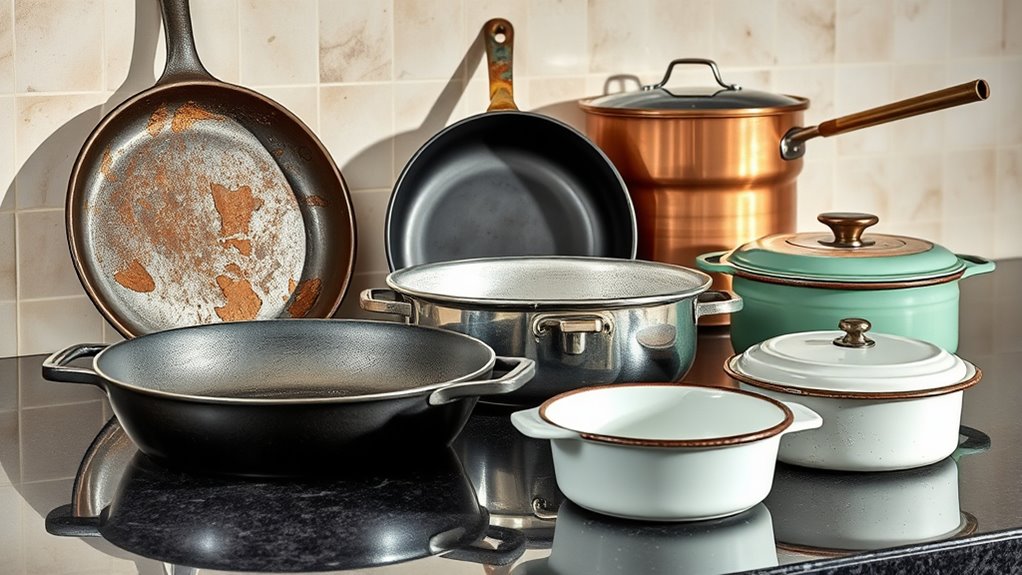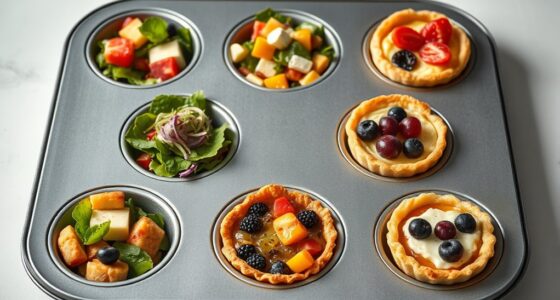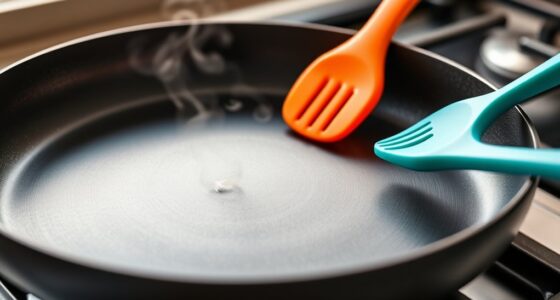You should never put these 7 cookware items in your dishwasher because harsh detergents, high heat, and tough water pressure damage their materials and coatings. Wooden utensils and cutting boards can warp or crack, cast iron loses its seasoning and rusts, and nonstick surfaces deteriorate faster. Copper, fine china, and delicate antiques are prone to tarnish, chipping, or fading. Insulated and metallic items also suffer damage, weakening their performance and appearance over time. Continue exploring to learn how to protect your cookware’s longevity.
Key Takeaways
- Dishwasher detergents and high heat can damage delicate finishes, coatings, and materials of certain cookware items.
- Prolonged exposure to moisture, heat, and harsh cleaning cycles causes rust, corrosion, or warping.
- Hand washing preserves the integrity, appearance, and non-stick or seasoning layers of specialized cookware.
- Metallic and antique items are vulnerable to tarnish, discoloration, and surface damage in dishwashers.
- Using a dishwasher can compromise seals, insulation, and structural parts, reducing lifespan and performance.
Wooden Utensils and Cutting Boards
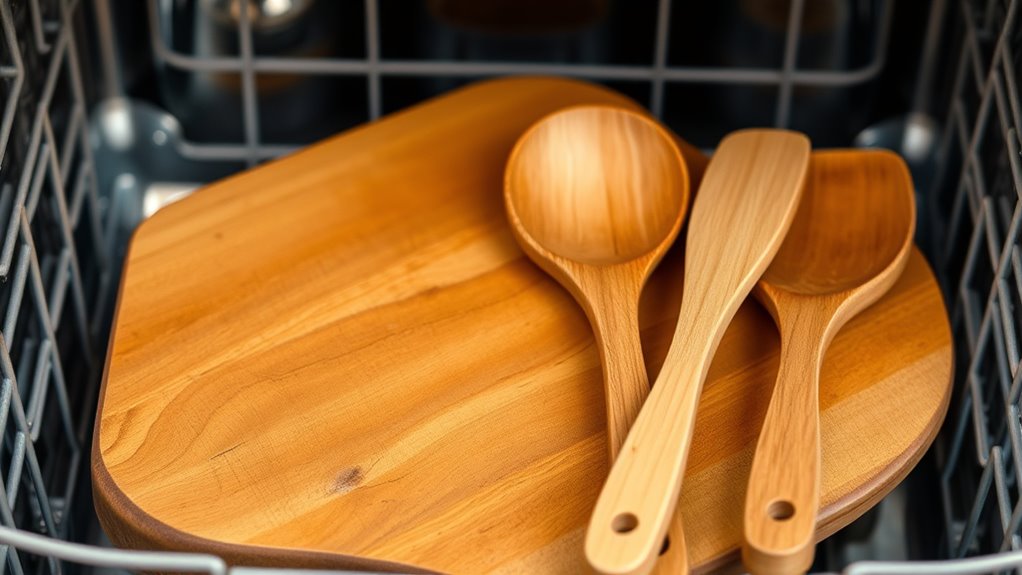
Although it might be tempting to toss your wooden utensils and cutting boards into the dishwasher for convenience, doing so can cause significant damage. The hot water and heat from the dishwasher can warp, crack, or split wooden utensils and cutting boards over time. Dishwasher detergents and prolonged soaking strip away natural oils and finishes, harming their appearance and durability. Excessive moisture from the cycle can lead to swelling and promote mold growth if not properly air dried. The high temperatures and drying cycles weaken glue joints in wooden-handled tools, risking handle detachment. To preserve their integrity, always hand wash your wooden utensils and cutting boards with gentle soap, then let them air dry thoroughly. Proper wood care techniques ensure your wooden kitchen tools remain functional and beautiful for years to come. Additionally, avoiding dishwasher exposure helps maintain their structural integrity and prolongs their lifespan.
Cast Iron Skillets and Pans
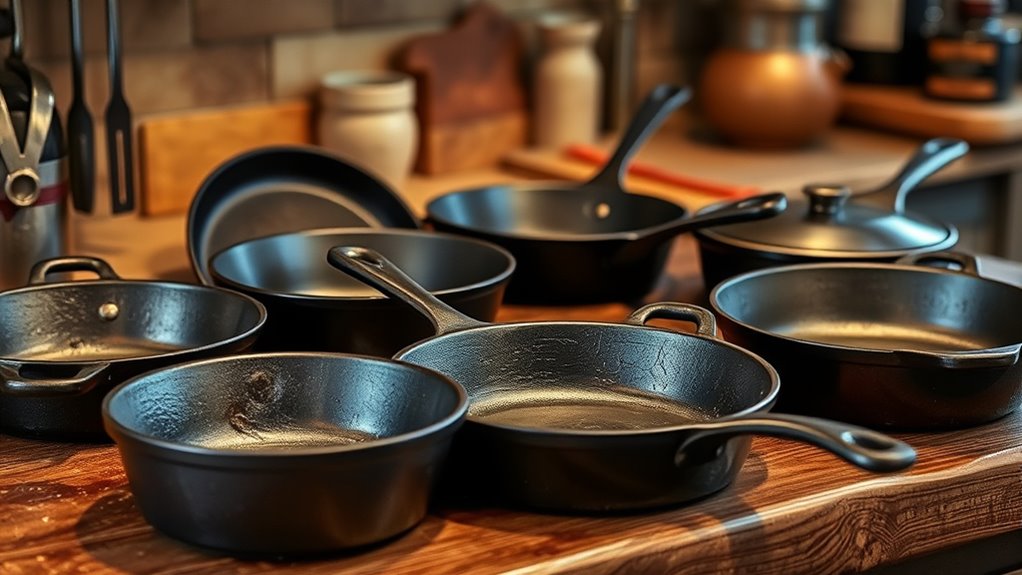
Using a dishwasher on your cast iron skillet can strip away its seasoning, making it prone to rust and sticking. The high moisture and harsh detergents accelerate corrosion, damaging the surface over time. To keep your skillet in top shape, hand wash it gently and dry it thoroughly after every use. Additionally, avoiding dishwasher cleaning helps preserve the skillet’s seasoning layer, which is essential for its non-stick properties and longevity. Regular maintenance, such as reapplying a light coat of oil, further protects the seasoning and maintains optimal performance. Proper care and maintenance also ensure that your cast iron skillet remains durable and effective for years to come. Incorporating proper cleaning techniques can further extend the lifespan of your cookware.
Rust and Corrosion
Ever wondered why your cast iron skillet develops rust after dishwasher cleaning? The harsh detergents and high heat in dishwashers strip away the seasoning, exposing raw metal to moisture. This moisture becomes trapped during cycles, preventing proper drying and accelerating rust formation. Over time, rust leads to corrosion and pitting, weakening the cast iron surface. Dishwasher damage also causes metal degradation, which further compromises the skillet’s integrity. Without its protective coating, your cast iron becomes vulnerable to ongoing rust and corrosion. To keep it in top shape, avoid dishwasher cleaning. Instead, wash your cast iron by hand and dry it thoroughly. Proper care preserves the seasoning layer, prevents rust, and extends the lifespan of your cookware. Understanding material resilience can help you choose the best cleaning practices to protect your cookware’s longevity. Additionally, using appropriate maintenance techniques ensures your cast iron remains durable and functional for years to come. Recognizing protective coatings in cookware materials can help you make informed decisions about cleaning and maintenance. Using the right cleaning practices is essential to maintain the durability and safety of your cookware.
Loss of Seasoning
Dishwasher cleaning can quickly strip away the seasoning layer on your cast iron skillet, leaving it dull and more vulnerable to rust. The harsh detergents and hot water in dishwashers remove the protective patina that gives cast iron its natural nonstick surface. Once the seasoning is gone, your cookware loses its ability to cook without sticking, and you’ll need to spend time re-seasoning and oiling it to restore its protective layer. Repeated dishwasher damage accelerates the loss of your cast iron’s nonstick properties and weakens its surface. To protect your skillet, always hand-wash with minimal soap, dry it thoroughly, and re-season regularly. Proper seasoning techniques can help you better care for your cast iron and maintain its performance over time. Incorporating proper cleaning methods can further ensure the longevity of your cookware’s seasoned surface. Additionally, using appropriate oils for seasoning can enhance the durability of the patina and improve its nonstick qualities. Understanding the environmental factors that influence seasoning can also help you optimize the care routine for your cast iron cookware.
Nonstick Cookware and Coatings
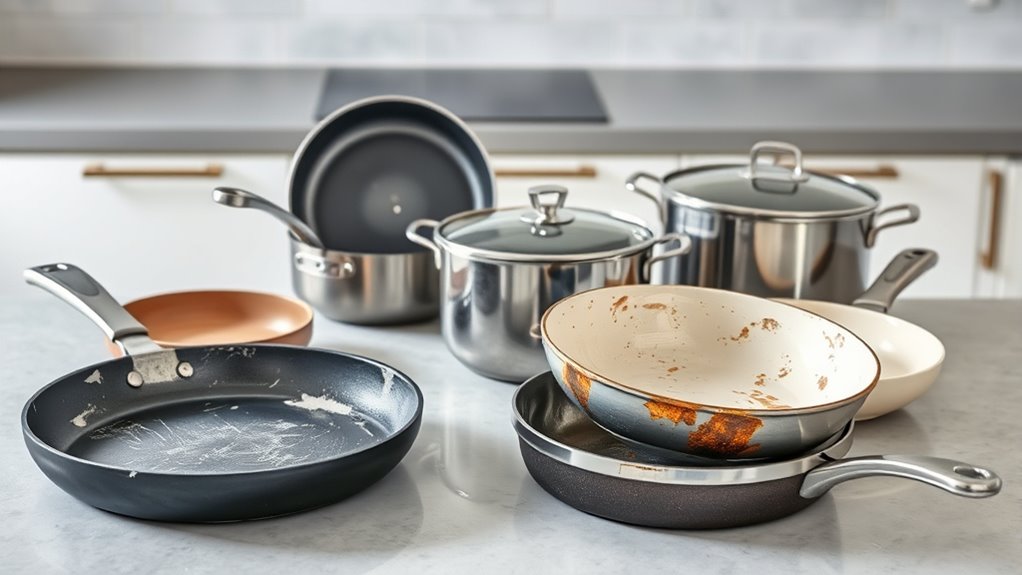
Nonstick cookware is designed to make cooking and cleaning easier, but exposing it to dishwasher conditions can quickly damage its delicate coating. Dishwasher detergents and high heat accelerate the deterioration of nonstick coatings, causing them to peel and lose their nonstick properties faster. The harsh environment and abrasive sponges used in dishwashers can cause scratches, reducing the cookware’s effectiveness and lifespan. Most manufacturers recommend hand washing only, using gentle sponges and mild soap, to preserve the coating’s integrity. Repeated dishwasher cycles increase the risk of damage, leading to peeling and diminished performance. Proper care and maintenance can significantly extend the lifespan of your nonstick cookware and keep it performing at its best. To extend the life of your nonstick cookware, always opt for hand washing and avoid dishwasher cleaning, ensuring your nonstick coatings stay intact longer. Additionally, proper maintenance practices play a crucial role in preventing damage caused by poor maintenance practices, which can accelerate wear and tear on your cookware.
Copper Pots, Pans, and Mugs
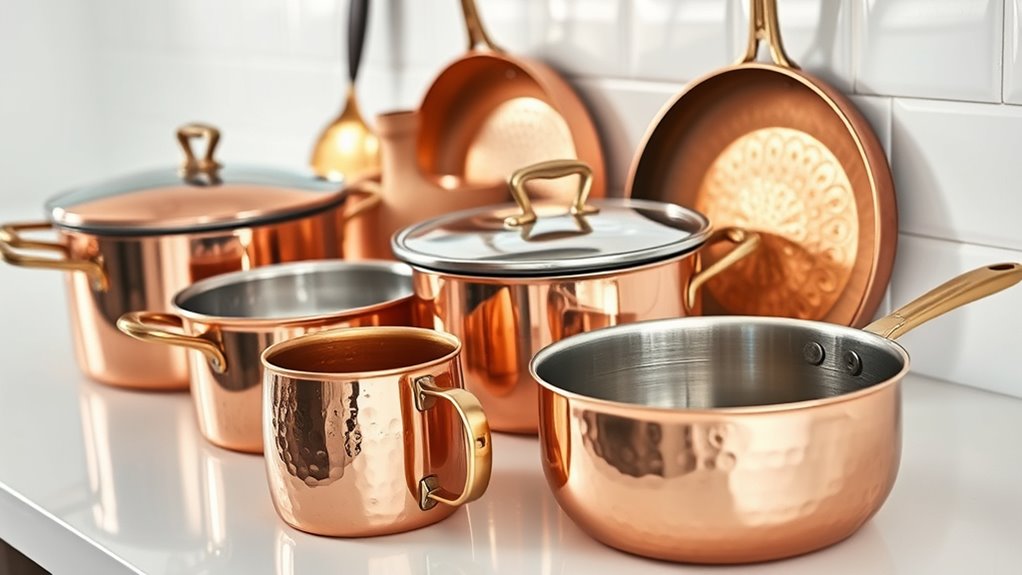
Do you know that cleaning copper cookware in your dishwasher can harm its appearance? Dishwasher detergents and high heat cause copper to tarnish, dull, and develop unattractive discoloration. Repeated cycles strip away the shiny finish of copper mugs, pots, and pans, diminishing their aesthetic appeal. Harsh cleaning agents accelerate oxidation, leading to persistent tarnish and loss of luster. To preserve your copper cookware’s vibrant color and shine, it’s best to hand wash them with mild soap and a soft cloth. Gentle cleaning helps maintain the delicate patina that develops over time, adding character and value to your pieces. Avoiding the dishwasher prevents damage, uneven discoloration, and the deterioration of decorative finishes, ensuring your copper cookware stays beautiful for years to come.
Fine China and Delicate Dinnerware
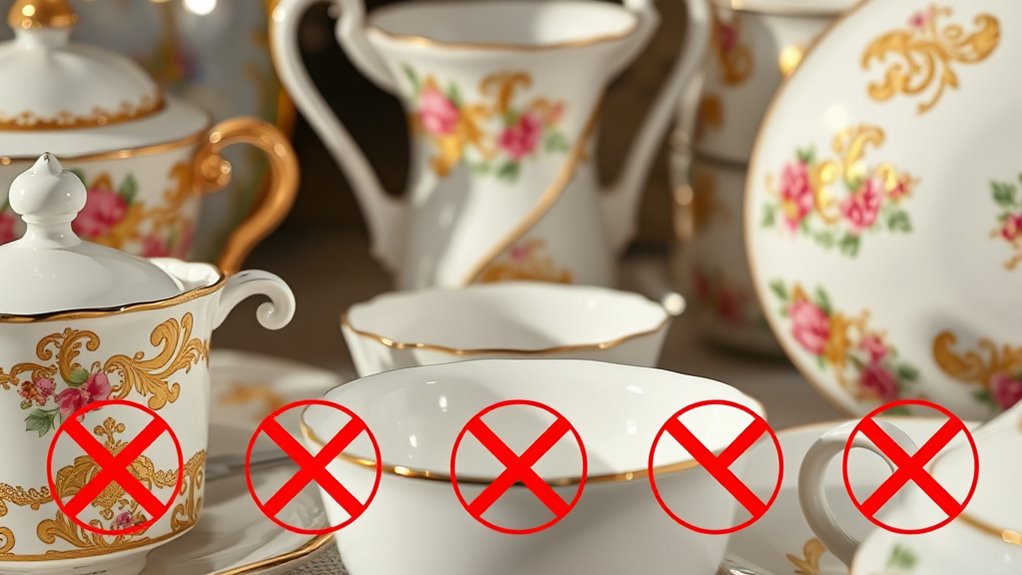
Because delicate fine china and intricate dinnerware are highly susceptible to damage, it’s best to avoid cleaning them in the dishwasher. High heat and strong detergents can cause dishwasher damage, especially to fragile porcelain and painted designs. Metallic trim, like gold or silver, can tarnish or peel off after repeated cycles. The intense water pressure and abrasive detergents can erode painted patterns, leading to chipping or fading. Over time, this can result in dullness or hairline cracks that weaken the material. To preserve their beauty and longevity, always hand wash your fine china and delicate dinnerware with mild soap and gentle handling. Proper care can help maintain their appearance and prevent deterioration, especially considering the risk of damage from dishwasher processes.
Insulated and Travel Mugs
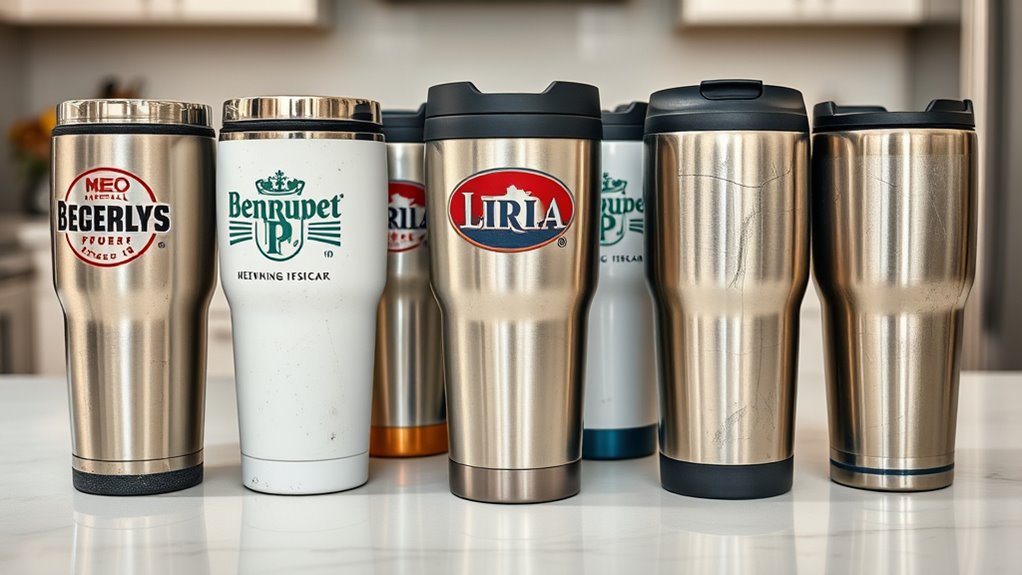
Ever wonder why you should skip the dishwasher when cleaning your insulated or travel mugs? Dishwasher damage can harm their seal integrity, causing leaks and reducing temperature retention. The high dishwasher heat and aggressive detergents can break down plastic components and rubber parts, leading to warping or degradation. Repeated dishwasher cycles may also weaken the insulation properties, making it harder for your mugs to keep drinks hot or cold. Plus, the intense water pressure can compromise the layers inside, diminishing overall performance. To preserve these features, hand wash your insulated and travel mugs with mild soap and warm water. This gentle cleaning method helps maintain their seals, insulation, and longevity, ensuring your mugs stay effective and leak-free for longer.
Metallic and Antique Items
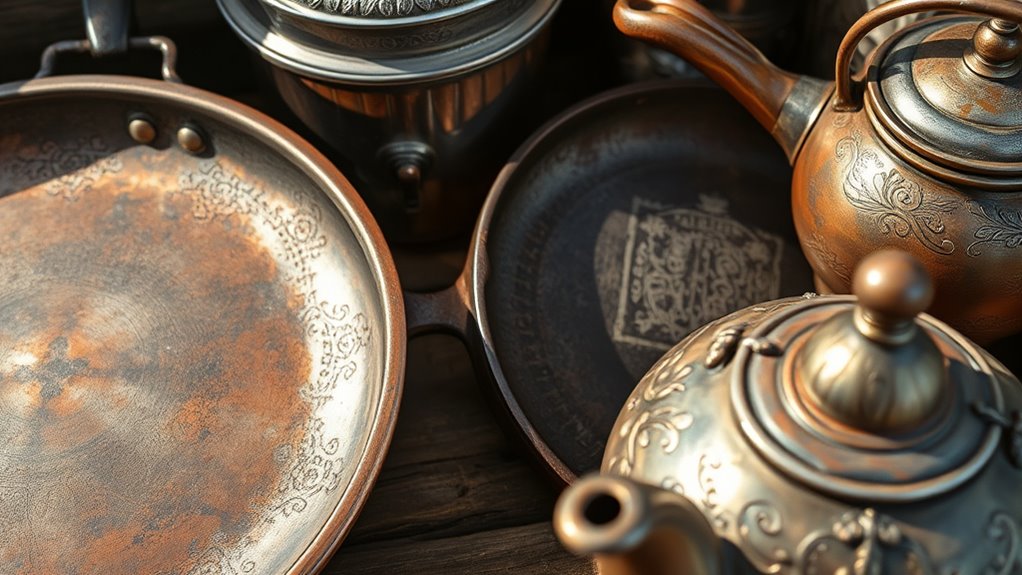
Dishwasher cleaning isn’t suitable for metallic and antique items, as the harsh environment can cause lasting damage. Copper cookware, antique cookware, and other metallic items are especially vulnerable to pitting, discoloration, and tarnish from high heat and abrasive detergents. Antique pieces with delicate finishes, such as golden decorations or painted details, risk chipping, fading, or peeling. The aggressive water jets and chemicals can erode these fragile surfaces, diminishing their beauty and value. Repeated dishwasher cycles can dull soft metals and cause permanent tarnish or spotting. To preserve their integrity, it’s best to hand wash metallic and antique items using mild soap and gentle tools. This careful approach helps maintain their shine, decorative details, and overall condition.
Frequently Asked Questions
What Happens if You Put Non-Dishwasher Safe Pans in the Dishwasher?
If you put non-dishwasher safe pans in the dishwasher, you risk damaging them. The harsh detergents and high heat can cause coatings to peel or discolor. Delicate materials like ceramic, aluminum, or copper may warp or crack. You could also strip seasoning from cast iron, leading to rust. Over time, this damages the pans and shortens their lifespan, forcing you to replace them sooner than expected.
What Cookware Is Not Dishwasher Safe?
You should avoid putting wooden items, cast iron, copper, nonstick, and vintage cookware in your dishwasher. Wood can warp or crack, cast iron loses seasoning and rusts, copper tarnishes, nonstick coatings degrade, and delicate vintage pieces may chip or fade. Hand washing these items helps preserve their quality, finish, and longevity. Using gentle cleaning methods guarantees your cookware stays in great shape for years to come.
Why Should You Not Put a Cheese Grater in the Dishwasher?
You shouldn’t put a cheese grater in the dishwasher because the harsh detergents and high heat can damage it. The tiny holes and crevices trap food, and dishwasher cleaning may not remove all residue, risking bacteria buildup. Plus, the abrasive action can cause rust spots or dull the sharp edges, reducing its effectiveness. Hand washing with warm, soapy water is gentler and helps your grater last longer.
What Should You Never Put in a Dishwasher?
You should never put certain items in your dishwasher because they can get damaged or ruined. Avoid delicate or vintage cookware, as harsh cycles can crack or chip them. High heat and detergents can warp or discolor materials like aluminum, copper, or nonstick coatings. Sharp tools like knives can dull, and fragile items such as crystal or hand-painted ceramics may crack or fade. Always check if items are dishwasher-safe before cleaning.
Conclusion
Think of your cookware as the soul of your kitchen’s story. Putting these delicate items in the dishwasher risks erasing their character and history. Each piece, from wooden utensils to antique treasures, holds memories and craftsmanship that deserve gentle care. Protect your culinary legacy by hand-washing what matters most. After all, true preservation isn’t about convenience—it’s about cherishing the stories etched into your cookware’s surface. Keep their legacy alive, one gentle wash at a time.
